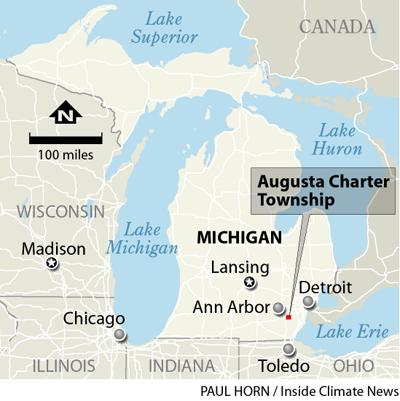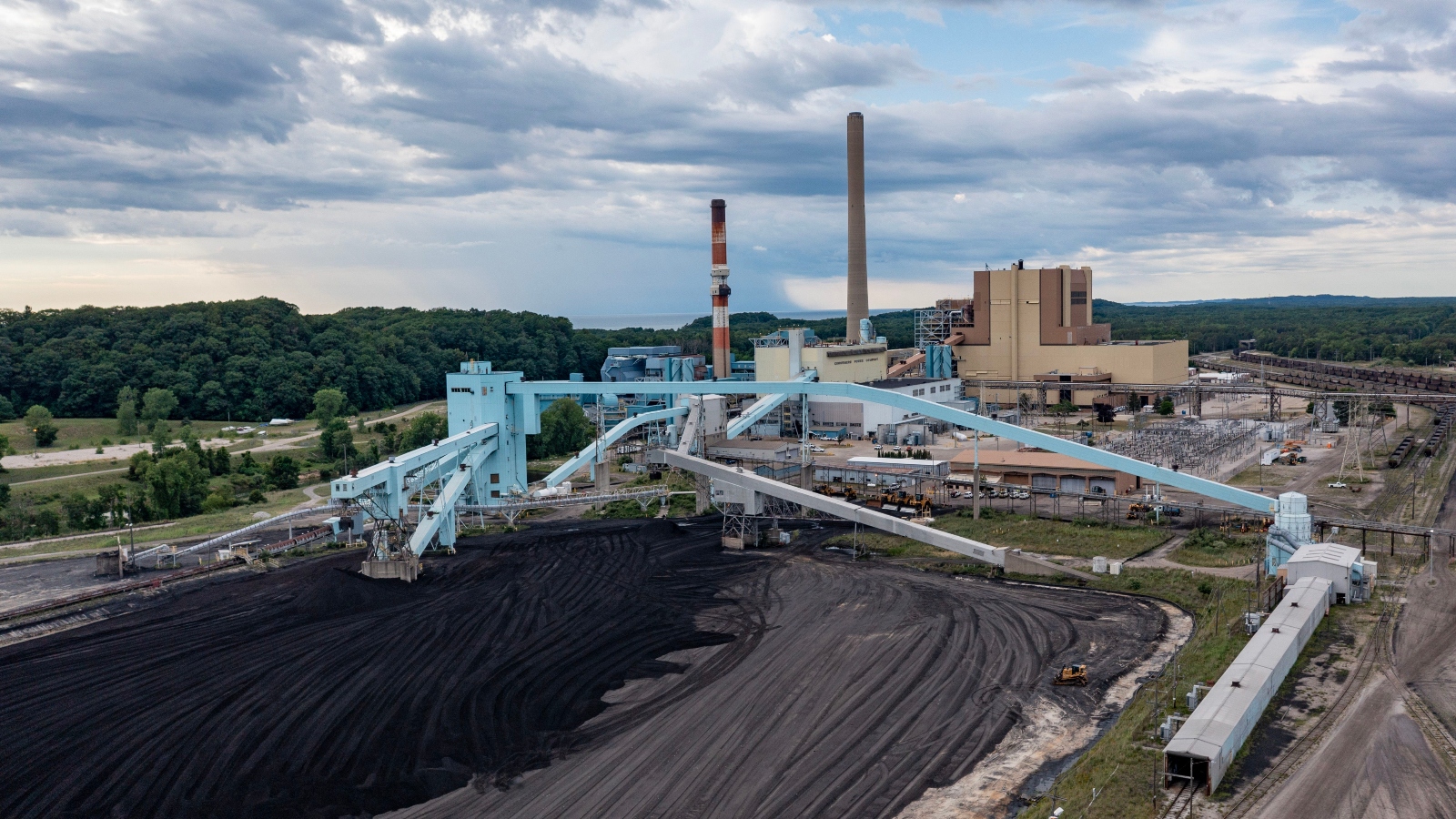Earlier this year, Augusta Charter Township resident Travis Matts saw several headlines about data center problems in cities across the country. He thought the implications for water, air and utility bills sounded dire, but it also seemed like a distant problem.
Until it suddenly hit home in May.
That's when Matts learned from his group of volunteers who clean up trash on the property that a data center was proposed to be built on an 822-acre site, mostly in Augusta Township, a small farming community southeast of Ann Arbor. The village leadership fully supported this.
Matts and others responded by quickly forming a new group of residents in opposition and began collecting ballot initiative signatures to put the data center rezoning before voters. The debate has consumed local politics and sharply divided residents of this town of about 8,000, leading to accusations of harassment and threats.
“It’s sad that we as residents have to fight tooth and nail to keep these things out of our backyards, but if we don’t, who will?” he asked. “We're taking this into our own hands.”
By August, the group Protect Augusta Charter Township (PACT) had collected enough signatures for a referendum, and PACT is confident residents will vote against the project, Matts added.
Courtesy of Google
The grassroots effort is part of a growing number of municipal fights that are unfolding in cities across Michigan—and across the U.S.—that could go off the rails data center plans. The centers are opposed by people across the political spectrum, and the debate is playing out in the nearby town of Saline. rejected similar data center plan in September.
In Augusta Township, the proposal pitted nearly 1,000 residents who signed the ballot initiative against the township's Board of Trustees, which unanimously approved the rezoning in July, and the developer behind the proposal, New York real estate company Thor Equities.
Thor is building data centers but hasn't announced a client though planning report noted technology companies such as Google and Microsoft use the type of equipment offered here. The centers typically house infrastructure for artificial intelligence and other computing purposes.
There are few details yet about what the center will look like, but plans call for it to include at least five large buildings on what is currently farmland and wetlands. The center can use 1 million gallons of water per day, a local news outlet reported. MLive reportedand will include large generators.
The board of trustees and supporters point to potential benefits including increased tax revenue for the cash-strapped township as well as improved water and sewer infrastructure.

“It would be a big deal for us,” said Augusta Township Clerk Kim Gonchi. She said the level of tax revenue was unclear, but added it was likely “millions of dollars.”
“It could make a huge difference to the village,” she added.
Opponents of the project have questioned the economic impact. They fear increased noise and light pollution and that the huge facility will destroy Augusta's rural character while increasing utility bills and causing power outages. PACT's efforts are aimed at preserving a “sense of place,” said Matts, whose family has lived in Augusta for 100 years.
“With this data center plan, they're essentially saying, 'We know this, but business is more important,'” Matts said. “Landscape and preserving the identity of a place is not on their list of needs.”
Residents needed 561 signatures to get the issue on the ballot, and they turned in 957 signatures collected over about two weeks in August. Township officials must certify the signatures and then develop the language for the ballot, which will be voted on in a special election no earlier than May 2026. Matts estimates PACT has spoken with 1,200 to 1,400 residents and the vast majority have signed the petition.
As the financial and environmental impacts of data centers have become more apparent, the public at large becoming increasingly concerned. In many communities, massive consumption of electricity and water has led to increased utility bills.
IN Michigan and elsewhere they have already demanded that new fossil fuel plants be built or kept open and are threatening derail transition to clean energy. Meanwhile, they can be a source of light, noise, water and air pollution.
Local fights happening across the state are residents' best line of defense, said Tim Minotas, legislative coordinator for the Sierra Club of Michigan.
“This is where people live and raise their families, so in the absence of state or federal protections, the onus is on our local communities to take a stand to protect themselves,” Minotas said.
“This is stalking”
The incident detailed in the previous news report and confirmed by four residents to Inside Climate News, described how a township official allegedly called police on PACT members in August. PACT set up a canopy and table on the side of the road to collect signatures in support of the ballot initiative near City Hall.
The responding officer allegedly found that the campaigners had done nothing wrong, but asked them to move the table out of the way. PACT questioned the municipality's intentions.
“Calling the police is harassment,” resident Deborah Fuqua-Frey, who opposes the project, said during the speech. public comment session after the incident.
Gonzi did not respond to Inside Climate News' questions about the incident. In a statement to the news outlet in late August. Planet DetroitGonchi said campaigners were positioned too close to a dangerous intersection.
Meanwhile, residents said they received anonymous handwritten notes in their mailboxes that they perceived as threats. The video shows Township Manager Todd Waller keep residents out talk about the data center during public comment at board meetings. Some residents questioned the ethics of Waller's reign and said it was part of a broader pattern of officials trying to silence critics of the project. Waller did not respond to requests for comment.
Local problems arose after a battle in the state Legislature in which progressive legislators strived Add consumer and environmental protections to data center incentives. They were not included in the bills that passed and may have helped mitigate some of the problems now being addressed at the local level, said Denise Keel, director of the nonprofit Michigan Climate Action Network.
“It’s one thing for there to be NIMBY-ism and people saying, ‘I don’t want this in my community,’ but with data centers, the concerns are real,” Keel said. “The centers suck up energy and, more importantly, they drive up our electricity rates.”
Advantages and disadvantages
Township officials downplayed PACT's problems with the project. Addressing concerns about light pollution, Gonchi said the facility's lights will be directed toward the ground to prevent them from flooding the surrounding area. She also told Inside Climate News that officials went to Toledo to visit the data center, used a sound level meter to measure decibels and found the level did not violate Augusta Township ordinances.
Moreover, according to Gonchi, the project will be built in the southwestern part of the village, away from most residents. She added that she had not seen any evidence that it would reduce network reliability or increase bills.
“I don’t understand all this and I don’t know where it comes from,” Gonzi told Inside Climate News.
Opponents of the project see it differently. They argue that the financial benefit is not worth the cost, yet they suspect lighting will be an issue.
“It won't be dark at night because there will be acres and acres of lights,” said one village resident, who declined to give her name for fear of retaliation. “It’s not your dark cornfield anymore, because there’s a glow that never goes out.”
Opponents of the project also questioned the accuracy of the sound level meter readings and said they did not take into account the effects of constant noise. Data centers have generators that often run on diesel, and they are used monthly as routine maintenance to keep them running, which can contribute to air and noise pollution.
More important, Matts said, is the loss of rural character. Matts said neither state leaders nor the Augusta Township Board of Supervisors addressed the issues, which he called “disappointing.”
“People have lived here a long time and we understand that things come and go and change and development happen, but something of this scale and magnitude – 1,000 industrial acres – is stupid in a community like this,” Matts said.










